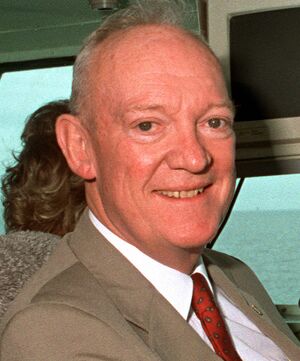John Eisenhower
( diplomat, soldier, historian) | |
|---|---|
 | |
| Born | August 3, 1922 |
| Died | December 21, 2013 (Age 91) |
| Nationality | US |
| Alma mater | United States Military Academy |
| Parents | • • Mamie Geneva Doud |
| Children | • Dwight David Eisenhower II • Barbara Anne Eisenhower • • Mary Jean Eisenhower |
Son of Dwight D. Eisenhower, US military historian
| |
John Sheldon Doud Eisenhower was a United States Army officer, diplomat, and military historian. He was a son of President Dwight D. Eisenhower and First Lady Mamie Eisenhower. His military career spanned from before, during, and after his father's presidency, and he left active duty in 1963 and then retired in 1974. From 1969 to 1971, Eisenhower was United States Ambassador to Belgium during the administration of President Richard Nixon, who was previously his father's vice president and also his daughter-in-law's father.
Background
John Sheldon Doud Eisenhower was born on August 3, 1922, in Denver, Colorado, to future U.S. President and United States Army General of the Army Dwight D. Eisenhower and his wife, Mamie; he was their second child. Their elder son, Doud, known affectionately as "Icky", died in 1921, at age three, after contracting scarlet fever. Eisenhower, like his father, attended the United States Military Academy, graduating on June 6, 1944, the day of the Normandy landings, which his father was commanding.[1]
Military career
Eisenhower served in the U.S. Army during World War II and the Korean War, remaining on active duty until 1963; then serving in the U.S. Army Reserve until retirement in 1975 – attaining the rank of brigadier general.[2] A decorated soldier, Eisenhower found his World War II military career thwarted by fears for his safety and concern from the top brass that his death or capture would be a distraction to his father, the Supreme Allied Commander. During World War II, he was assigned to intelligence and administrative duties. This issue arose again in 1952 when Major Eisenhower was assigned to fight in a combat unit in Korea while his father ran for president. But unlike World War II, John was able to see combat in Korea.[3] After serving combat with an infantry battalion, he was reassigned to the 3rd Division headquarters.
Government career
During his father's presidency, John Eisenhower was Assistant Staff Secretary in the White House, on the Army's General Staff, and in the White House as assistant to General Andrew Goodpaster.
In the administration of President Richard Nixon, who had been his father's vice president, he was U.S. Ambassador to Belgium from 1969 to 1971. In 1972, President Nixon appointed Eisenhower Chairman of the Interagency Classification Review Committee.[4] In 1975, he served President Gerald Ford as chairman of the President's Advisory Committee on Refugees.[5]
Later life and writing
As a military historian, Eisenhower wrote several books, including The Bitter Woods, a study of the Battle of the Bulge, and So Far from God, a history of the Mexican–American War. In a New York Times review of the latter, historian Stephen W. Sears remarked that Eisenhower "writes briskly and authoritatively, and his judgments are worth reading."[6] Eisenhower wrote Zachary Taylor: The American Presidents Series: The 12th President, 1849–1850 (2008).[7][8] John Eisenhower also wrote the forewords to Borrowed Soldiers, by Mitchell Yockelson of the U.S. National Archives, and to Kenneth W. Rendell's Politics, War and Personality: 50 Iconic Documents of World War II.
References
- ↑ 'John Eisenhower, Military Historian and Son of the President, Dies at 91,' The New York Times, Richard Goldstein, December 22. 2013
- ↑ http://www.accuracyproject.org/cbe-Eisenhower,JohnSheldonDoud.html
- ↑ https://www.timesunion.com/news/amp/Obituary-Eisenhower-s-son-John-at-91-5086981.php
- ↑ https://www.archives.gov/isoo/about/history.html
- ↑ http://www.presidency.ucsb.edu/ws/index.php?pid=4924
- ↑ https://www.nytimes.com/1989/04/02/books/land-grab-on-the-rio-grande.html?scp=2&sq=so%20far%20from%20god:%20the%20u.s.%20war&st=cs
- ↑ https://archive.org/details/zacharytaylor00eise
- ↑ https://www.nytimes.com/2008/09/28/opinion/28eisenhower.html